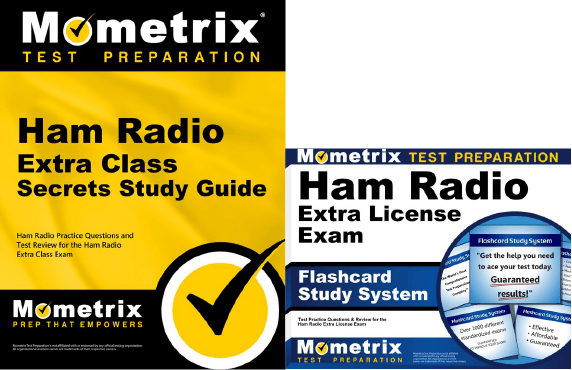If you need help studying for the Ham Radio Extra Class exam or just want some more information about what the exam is like, you’ve come to the right place.
Click below to take a free Ham Radio Extra Class practice test!
Exam Eligibility
Before you can register to take the Ham Radio Extra Class exam, you’ll need to take and pass the Technician Class and General Class exams. Once those are under your belt, you’ll be set to take the Extra Class exam!
What’s on the Exam?
The Extra Class exam contains 50 multiple-choice questions, which are grouped into 10 sections. The questions in each section are pulled from a question pool, so each administration of the test contains a different set of questions.
There isn’t a set time limit, but it usually takes anywhere from 10 to 45 minutes to finish the exam.
Let’s take a closer look at the different sections.
1. COMMISSION RULES
6 questions
- Frequency privileges
- Signal frequency range
- Automatic message forwarding
- General operating restrictions
- Spurious emissions
- Automatic and remote control
- Band-specific regulations
- Operating in and communicating with foreign countries
- Amateur Space and Earth stations
- Volunteer examiner program: definitions
- Preparation and administration of exams
- External RF power amplifiers
- Prohibited communications
2. OPERATING PROCEDURES
5 questions
- Amateur satellites
- Orbital mechanics
- Frequencies and modes
- Satellite hardware
- Satellite operations
- Fast-scan television standards and techniques
- Slow-scan television standards and techniques
- Contest and DX operating
- Remote operation techniques
- Digital modes and procedures for VHF and UHF
- APRS
- EME procedures
- Operating HF digital modes
3. RADIO WAVE PROPAGATION
3 questions
- Earth-Moon-Earth (EME) communications
- Meteor scatter
- Microwave tropospheric and scatter propagation
- Auroral propagation
- Daily variation of ionospheric propagation
- Circular polarization
- Transequatorial propagation
- Long-path propagation
- Ordinary and extraordinary waves
- Chordal hop
- Sporadic-E mechanisms
4. AMATEUR PRACTICES
5 questions
- Analog and digital instruments
- Spectrum analyzers
- Antenna analyzers
- Oscilloscopes
- RF measurements
- Instrument accuracy and performance limitations
- Techniques to minimize errors
- Measurement of Q
- Instrument calibration
- S parameters
- Vector network analyzers
- Phase noise
- Noise floor
5. ELECTRICAL PRINCIPLES
4 questions
- Characteristics of resonant circuits
- Series and parallel resonance
- Definitions and effects of Q
- Half-power bandwidth
- RL and RC time constants
- Phase angle in reactive circuits and components
- Admittance and susceptance
- Skin effect
- Real and reactive power
6. CIRCUIT COMPONENTS
6 questions
- Semiconductor materials and devices
- Bipolar junction transistors
- Operation and types of field-effect transistors
- Diodes
- Families of digital ICs
- Transformers
- Piezoelectric devices
- Semiconductor materials and packages for RF use
- Optical sensors and encoders
7. PRACTICAL CIRCUITS
8 questions
- Digital circuit principles and logic circuits
- Classes of logic elements
- Positive and negative logic
- Frequency dividers
- Truth tables
- Class of operation
- Vacuum tube and solid-state circuits
- Distortion and intermodulation
- Types of filters
- Impedance matching
- Power supplies and voltage regulators
- Digital signal processing (DSP) filtering, modulation, and demodulation
- Characteristics and applications of operational amplifiers
8. SIGNALS AND EMISSIONS
4 questions
- Fourier analysis
- RMS measurements
- Average RF power and peak envelope power (PEP)
- Analog/digital conversion
- Modulation methods
- Frequency- and time-division multiplexing
- Digital communication modes
- Error correction
9. ANTENNAS AND TRANSMISSION LINES
8 questions
- Radiation resistance
- Gain
- Beamwidth
- Efficiency
- Effective radiated power (ERP)
- Effective isotropic radiated power (EIRP)
- Azimuth and elevation patterns
- Gain as a function of pattern
- Antenna modeling
- Practical wire antennas
- Folded dipoles
- Phased arrays
- Effects of ground near antennas
10. SAFETY
1 question
- RF radiation hazards
- Hazardous materials
- Grounding
How to Register
To register, you’ll need to visit the ARRL® website to locate a testing session near you, which will provide you with the necessary contacts, time, and location of available testing appointments.
Before you can actually take the exam, you’ll also need to register with the FCC and get an FCC Registration Number (FRN).
Exam Scores
To get a passing score, you’ll need to get a score of at least 74%, which means you answered at least 37 questions correctly.
You should be given your final score report as soon as you finish the exam.
Retaking the Exam
If you didn’t get a passing score on your first try, that’s okay! You can retake the test as many times as you need to, and you can even retake it on the same day as your first attempt.
Keep in mind that the questions you receive on retakes will be different than on your first attempt.
FAQs
How many questions are on the Ham Radio Extra Class exam?
The exam contains 50 questions.
What is the time limit for the Ham Radio Extra Class exam?
There isn’t a strict time limit, but it usually takes less than an hour to complete.
What is the passing score for the Ham Radio Extra Class exam?
You’ll need to get a final score of at least 74% to pass.
How much does the Ham Radio Extra Class exam cost?
The testing fee varies, but it usually costs around $15.
ARRL is a registered trademark of The American Radio Relay League, Inc., which is not affiliated with Mometrix Test Preparation and does not endorse this page.



 Ham Radio Study Guide
Ham Radio Study Guide Ham Radio Flashcards
Ham Radio Flashcards